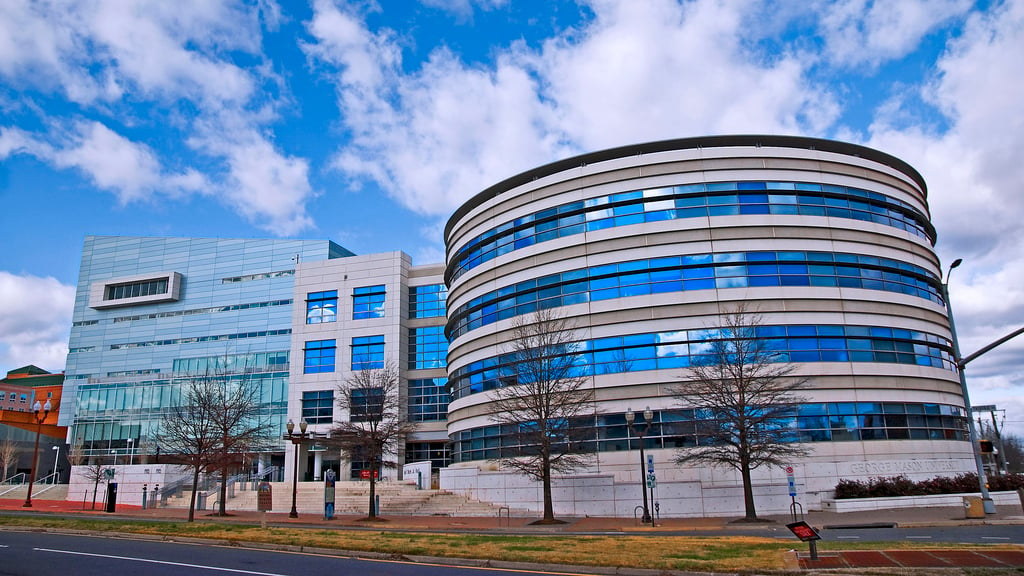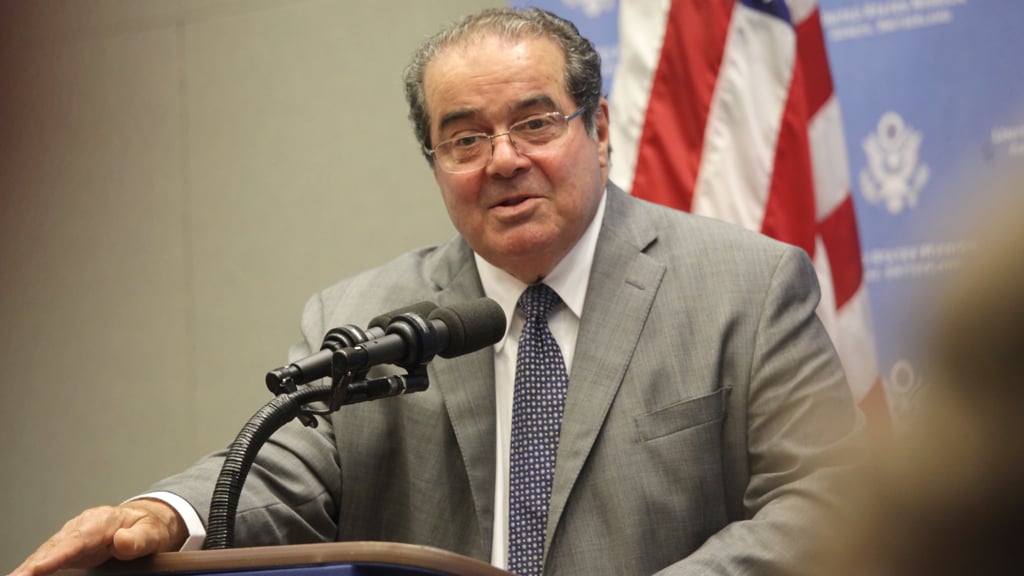When George Mason University announced plans to rename its law school after the late Supreme Court Justice Antonin Scalia, the university’s president, Ángel Cabrera, welcomed it as a “milestone” for the Northern Virginia institution. Henry Butler, the law school’s dean, said Scalia’s name “evokes the very strengths of our school: civil liberties, law and economics, and constitutional law.”
But to some members of the GMU community, the school’s rebranding as the Antonin Scalia Law School—the result of a $20 million gift from an anonymous donor with ties to the conservative Federalist Society—has some less welcome connotations.
“I think the main complaint has been renaming our school to the name of a borderline racist who’s made terrible comments,” Courtnay Sellers, the president of GMU’s Black Law Student Association, tells Washingtonian.
Sellers is referring to a remark Scalia made last December during oral arguments in Fisher v. Texas, a case surrounding affirmative-action admissions policies at the University of Texas, that seemed to suggest he believes black students belong at less-academically rigorous colleges.
Many African-American scientists, Scalia said, “come from lesser schools where they do not feel that they’re being pushed ahead in classes that are too fast for them. I’m just not impressed by the fact that the University of Texas may have fewer. Maybe it ought to have fewer. And maybe some—you know, when you take more, the number of blacks, really competent blacks, admitted to lesser schools, turns out to be less.”
In a resolution approved at a meeting of the Faculty Senate last week, professors called into question “the celebration of a Supreme Court Justice who made numerous public offensive comments about various groups—including people of color, women, and LGBTQ individuals—which this university has appropriately gone to some lengths to embrace as valued parts of the university community.”
Transparency is another sore point.
The school announced the name change on March 31, less than two months after Scalia died on a hunting trip in Texas. (The rollout was complicated after delighted Scalia opponents discovered the original new name, “Antonin Scalia School of Law,” made for an anatomically naughty acronym.)
The $20 million donation came after Butler asked the Charles Koch Foundation—the philanthropic organization headed by a billionaire who has funded many right-wing political candidates and issue campaigns—for $30 million. The foundation instead offered a $10 million “challenge gift” that would be awarded if the school could scrounge up the other $20 million. The entire sum is the largest financial contribution to the law school in its history and will be used to grow the law school’s faculty and award between 50 and 60 scholarships each academic year.
On Wednesday, the university’s Faculty Senate is expected to deliberate a resolution opposing the law school’s new name, and a student Facebook group called Transparent GMU is demanding the university’s top officials be more open about its financial ties to the Koch Foundation.
Still, it’s the law school’s black students who say they feel the impact of celebrating Scalia’s legacy much more directly. While GMU’s main undergraduate campus in Fairfax is relatively mixed—US News ranks it as the sixth-most diverse among major research universities—the law school, in Arlington, is overwhelmingly white. Sellers says only about 20 of the roughly 500 students are black, which contributed toward feelings of isolation well before the school renamed itself after Scalia. Sellers says she and other BLSA members have heard “really insensitive” in-class comments from other students about rape, women’s issues, and rape, among other topics.
“I went to Virginia Tech,” Sellers says. “Virginia Tech is a conservative school, but this is worse. You feel alone constantly.”
“I have never heard any complaints about insensitivity to race or women’s issues,” Butler tells Washingtonian, “either as dean or a professor.”
Desiree Sholes, a second-year student who is black, says she’s also heard off-putting remarks in classes. She and Sellers both say they knew the school skewed mostly white and politically conservative before enrolling, but that its location and relatively low in-state tuition made it appealing. Administrators, Sholes says, also seemed to be making an effort to broaden the student body.

“It was my understanding the direction the school was trying to go in, up the number of students of color, who identify as gay, because it is a predominantly white, conservative school,” Sholes says.
Putting Scalia’s name on the school, though, could negate any forward motion. “I know there are certain groups of students who aren’t going to apply, and I think that’s going to hurt the school more than the $30 million is going to help it,” she says.
Sellers and Sholes also have another concern about adding Scalia’s name to their school: the wording on the diplomas they’ll receive when they graduate. While Sellers knows her degree will only say George Mason University when she graduates later this month, first- and second-year students like Sholes are still waiting to find out if they’ll have Scalia’s name on their diplomas, or if the class of 2019—which begins this fall—will be the first group to graduate under the school’s new name.
“That’s something the 1Ls and 2Ls have been struggling with,” Sellers says. “I have heard that anyone who is currently at the law school will just have ‘George Mason’.” School administrators have not answered Washingtonian‘s questions about how future diplomas will read.
But even with a diploma without Scalia’s name, Sellers anticipates there may still be some awkwardness when she looks for a job, especially if she pursues a practice that involves voting rights or women’s health.
***
The uncertainty around diplomas has echoes in the vagueness that surrounds the gift that led to the school’s new name. Large gifts from anonymous donors are common enough in academia, but the terms of the donation from the mystery Federalist Society member who gave GMU $20 million leave a remarkable amount of control in hands of both the donor and Scalia’s family.
The terms of the gift are laid out in an agreement, which you can read below, dated March 31 and signed by Cabrera; Janet Bingham, the president of the George Mason University Foundation, which manages gifts the school receives from private donors; and the donor, whose name is redacted. Among the first stipulations in the document is under a subsection about “the school’s mission and dean,” with Butler mentioned specifically.
“Dr. Henry N. Butler, who was selected by the University, is currently the dean of the School (the ‘Dean’). The Parties believe the Dean is a critical part of the School’s Mission; therefore, if the individual holding the Dean position changes, the University shall immediately notify the Donor.”
The agreement between GMU and the donor also gives Scalia’s estate the power to revoke the late justice’s name from the law school if his survivors determine the school “has changed such that its continued use of the name would reflect unfavorably upon the reputation or legacy of the Justice.” This right is reserved through the lifetimes of Scalia’s grandchildren who were at least 16 years old when he died; Scalia had 36 grandchildren.
The Faculty Senate, which represents the entire university, takes umbrage at the language regarding Butler, who became the dean in June 2015 and earns $400,000 per year, according to a Washington Business Journal database of Virginia public-employee salaries.
“It is the responsibility of the Law School Faculty and the GMU Administration, not outside donors, to determine who is appointed and continues to serve as Dean,” reads the resolution that will be discussed at Wednesday’s meeting. “To tie gifts totaling [$30 million] to the ongoing tenure of Dean Butler is unacceptable.”
The resolution is part of a larger split between the law school and the main campus. One hundred and forty GMU professors have signed a letter opposing the change: “This renaming undermines our mission as a public university and tarnishes our reputation,” the April 7 letter reads. “We also recognize it as an affront to those in our community who have been the targets of Scalia’s racism, sexism, and homophobia.”
Law-school professors have fired back. Lloyd Cohen, who specializes in estate law and applied economics, told the National Law Journal the main university faculty’s opposition to Scalia’s name is “an affront, an intrusion, and a hostile act.”
Cabrera has pushed back as well. In an April 29 memorandum to the Faculty Senate, which was first reported by the Washington Post, he wrote:
In a large and proudly diverse university like ours, it is not surprising that the opinions of an influential individual like the late Supreme Court Justice Antonin Scalia would generate a wide variety of reactions. I acknowledge and respect the fact that some of you find some of his opinions objectionable and even personally offensive.
Agreement with his views is, however, not the reason why we are renaming the law school for Justice Scalia. We are not endorsing his opinions on any specific issue. We are recognizing a man who served our country at the highest level of government for 30 years and who many experts of diverse ideological persuasions—from faculty colleagues in our law school, to his peers on the Supreme Court, to the president of the United States—consider to have been a great jurist who had a profound impact in the legal field.
Cabrera also defended the university’s multiple gifts from the Charles Koch Foundation, which has given GMU more than $50 million over the past decade, more than any other school it has donated to. “To put things in perspective, that would amount to about 0.6 percent of our average annual budget over this period,” he writes.
GMU’s Board of Visitors has already approved the name change, and the last official hurdle for the law school’s name change is approval from the State Council of Higher Education for Virginia, a 13-member board whose members are appointed by the governor. Even though some Democratic members of the General Assembly have criticized sticking Scalia’s name on the law school, Democratic Governor Terry McAuliffe lent his support when the $30 million gift was first announced.
Most troubling to students like Sellers and Sholes, though, is university administrators’ apparent intention to move forward on the name change without much deliberation.
“They know there are complaints,” Sellers says. “But part of the problem is we do feel we can’t do anything about it. It feels kind of gross.”
Grant Agreement Redacted 4.7.16 by Benjamin Freed



















